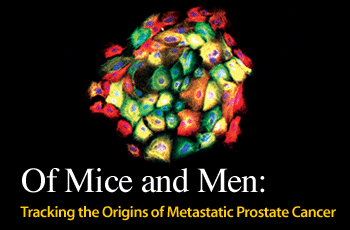Features

In most cases, prostate cancer is a treatable disease. Typically slow growing tumors that occur in men at a median age of 70 years are often treated effectively by interfering with androgen hormone signaling. But in 10 percent of cases, prostate cancers metastasize, become resistant to androgen deprivation therapy, and turn lethal. Kathleen Kelly, Ph.D., Chief of CCR’s Cell and Cancer Biology Branch, has a long-standing interest in understanding the transformation from normal prostate cells into primary cancer and then into metastatic disease. Led by a desire to identify the earliest origins of prostate cancer, Kelly turned to a model system that allows her to study the cells that give rise to the disease as well as trace its metastatic spread. Read the full story »
It’s All About the Client: The Development of Hsp90 Inhibitors as Anti-Cancer Agents
Approximately one to two percent of all proteins found in a cell are the evolutionarily conserved heat shock 90 (Hsp90) proteins. These proteins, so ubiquitous and functionally complex, are a challenge to study in mammalian cells. In the 1990s, Len Neckers, Ph.D., Senior Investigator in CCR’s Urologic Oncology Branch, was among the first to recognize that Hsp90 inhibitors could be powerful drugs in the fight against cancer. Today, 19 inhibitors of Hsp90 have been approved for clinical trial as targeted anti-cancer agents, and the Neckers laboratory is combining yeast genetics with work in mammalian cell lines and mouse models to define the next generation of Hsp90 inhibitors. Read more about Hsp90 inhibitors »
Don’t Throw Out the Packing Materials
Most illustrations of DNA depict a kind of ladder spiraling off into the distance, the ladder being the famous DNA double helix consisting of paired nucleotide bases. Although it has long been known that mammalian DNA is packed very tightly and systematically with specialized proteins into material called chromatin, researchers are only now beginning to appreciate the importance of chromatin structure. The research of Gordon Hager, Ph.D., Chief of the Laboratory of Receptor Biology and Gene Expression, has brought him inexorably closer to the pivotal role and complex dynamics of chromatin structure in the control of gene regulation. Read more about chromatin »
News
Setting the Sun on Skin Cancer
Interferon-γ has been found to promote UV-induced melanoma in a mouse model
Hitting the Target
Researchers have identified a possible target for treating the most aggressive form of lymphoma.
Patent Pool Goes Global
CCR-developed HIV drug darunavir is the first patent licensed to the Medicines Patent Pool.
The Frontiers of Thymic Malignancy
The first International Conference on Thymic Malignancies at the NIH provided a forum to better manage this rare disease.
A Look at Rare Diseases, from Molecules to Patients
Workshop on Xeroderma pigmentosum, Cockayne syndrome, and trichothiodystrophy examines diseases of DNA repair, cancer, and premature aging.
Test Before You Treat
CCR researcher Frank Gonzalez, Ph.D., is recognized for the development of a life-saving diagnostic test to identify cancer patients that may experience 5-fluorouracil toxicity.
In Conversation:
Research Fellow Ram Savan, Ph.D.


















